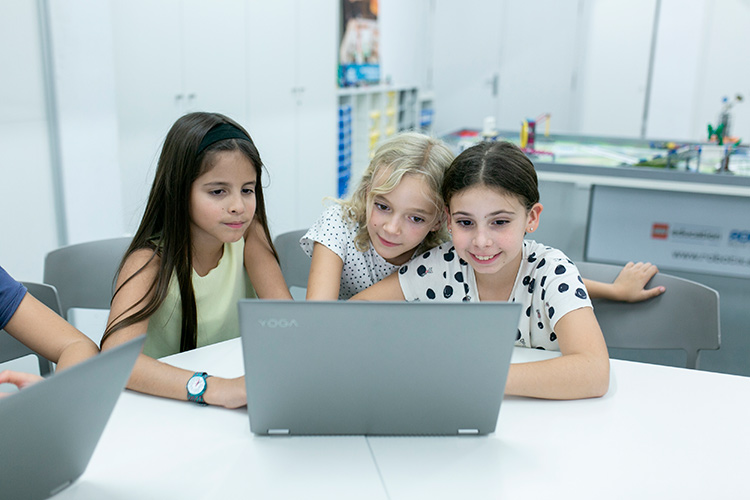Hidralia and the Aquae Foundation start the 2nd edition of Aquae STEM, which this course organizes webinars with female references in science
In the previous edition 2,500 students from 2nd to 4th Primary participated throughout Spain and 500 from Andalusia and this course expands to 5th
The Aquae STEM program of the foundation of Hidralia, Aquae Foundation, launches its second edition with a remarkable novelty: monthly webinars will be organized with leading women in the world of science. The objective of this educational program is to encourage the interest of students from 2nd to 6th Grade for scientific careers.

One of the big problems faced by girls of this age to link up to STEM (Science, Technology, Engineering and Mathematics) is the lack of female references in these fields. In this sense, Aquae STEM will bring monthly students from the more than 50 schools, six centers in Andalusia (although there are still free places if any center wants to sign up for this initiative), in which Aquae STEM is already developing, the experiences of Spanish engineers, mathematics, biotechnologies or computer scientists to arouse their interest in these disciplines.
For the first webinar, which takes place at the end of this month, an Andalusian woman has been chosen for this prestigious program. In this way, Monserrat Zamorano, the first road engineer to become a professor at the University of Granada, will be the rapporteur in charge of opening this initiative that was already a great reception last year for the schools in which it was taught.
Monserrat is also the director of the School of Road Engineers of Granada, the first woman also to hold that position in Spain; and this year he has received the Andalusian Medal of Environmental Merit, a recognition that has not previously fallen to any other engineering professional. He is a specialist in Environmental Technologies and in recent years has focused on waste management, in areas such as environmental diagnosis of landfills or energy recovery of waste.
On the other hand, Irene Lapuente, training physics and specialist in communication and scientific dissemination, will be the driver of these webinars. Irene is founder and director of Newton's Mandarin, a company that "matches" science and technology with disciplines such as art or design. Irene Lapuente was already a driver of the event that took place in San Fernando (Cádiz) for international women's and girls' day in science and that allowed schoolchildren to approach female stem references.
"We are currently undergoing major changes, but until now the female characters in novels, films or children's series normally existed in relation to a male figure and their lives lacked dreams or ambitions of their own. This makes it difficult for girls to identify with strong roles and, little by little, their imaginary is filled with options that put them in the background. It's important to see that women have been involved with math, science, engineering or programming forever. It is necessary to meet current women who have fought for their dreams because that encourages girls to do the same and not to let themselves be run over by the dreams of others or not to lose confidence in themselves", says Lapuente.
"Scientific Awakening" in Covid's Time
Aquae STEM, which was launched at the end of 2019, closed the previous edition with the participation of 2,500 girls from 2nd to 4th Primary, to which 5th graders will join during this new course, as well as new schools that have joined the program.
The arrival of the coronavirus has not interrupted the development of Aquae STEM, which has continued to form with online sessions, both to girls, who during the confinement carried out the 3rd phase of this project from their homes (online challenges based on finding sustainable solutions to water-related challenges using a programming language); teachers involved.
"Helping anyone achieve their dreams is a wonderful thing. In this sense, Aquae STEM is a program that supports girls to overcome barriers and whatever they want. I had a very pleasant experience last year in San Fernando (Cádiz), where I met the project in the first person; There I saw many avid girls of knowledge and three women with established careers in science and engineering who were a great example to the audience", explains Irene Lapuente.
The aim is to arouse vocations among girls in a sector with a low female presence: only 28% of scientific research worldwide is named after women, according to the United Nations Education, Science and Culture Organization (UNESCO). According to the report 'Deciphering the Keys: Women's and Girls' Stem Education', which STEM published in 2019, only 35% of students enrolled in STEM careers in higher education are women.
"Gender discrimination starts from birth. The social prejudices we drag lead us to expect girls to be calm, not to speak up, not to get dirty, not to run... But the desire to learn is not quiet, self-confidence makes you want to speak up, the most interesting things get dirty and if you want to do important things you run to achieve them. These prejudices are maintained until adulthood and women who want to lead teams have to fight much more than their male peers. Obviously, that doesn't help, but it doesn't help advertising, many traditions and double speeches. I think the transformation will come from micro and macro changes. So starting with education seems to me to be a very good idea to go from there, expand the change", stresses the driver of Aquae STEM webinars.
